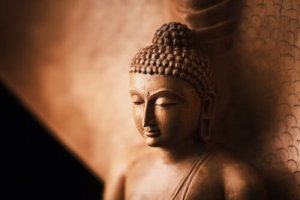A Buddhist Story about Patience and Mental Peace

We have a bad habit of wanting almost everything instantly and doing things immediately. We prefer to change our decisions than to have patience. It’s more common for people to give up than to put in some effort. However, this Buddhist story will teach you the importance of patience to achieve mental peace.
It usually bothers us to postpone satisfying our desires and to have to wait. In fact, when we believe we’ll have to wait, our mind beings to bombard us with worries and expectations. In particular, it does so to try and speed up the time you need to spend waiting.
Consequently, we live a rapid-paced life with a lot of both internal and external distractions. We wander from one place to another, with no other direction than the one that leads to our immediate satisfaction. Additionally, we must add the hubbub of our inner voice, because our worries tend to be present in everything we do. It’s as if we were somehow addicted to it. We love to think, create hypotheses, and get caught up in the labyrinths and vicious circles of our beliefs.
However, perhaps we’re ignoring the most important thing: how to get out of these self-imposed traps. How do we free ourselves from mental traps? Maybe the following Buddhist story will give us the answer.
“The mind is a superb interment if used rightly. Used wrongly, however, it becomes very destructive. To put it more accurately, it is not so much that you use your mind wrongly — you usually don’t use it at all. It uses you. This is the disease. You believe that you are your mind. This is the delusion. The instrument has taken you over.”
-Eckhart Tolle-

The Buddhist story
Buddha and his disciples decided to undertake a journey in which they would have to cross various territories and cities. One day, they saw a lake in the distance. They decided to stop there since they were thirsty. When they arrived, Buddha said to his youngest and most impatient disciple: “I’m thirsty. Can you bring me some water from that lake?”
The disciple went to the lake, but when he arrived he noticed that a wagon of oxen was crossing it. Little by little, the water became cloudy. After this happened, the disciple thought, “I can’t give the teacher this muddy water to drink.” Thus, he went back and told Buddha, “The water is very muddy, I don’t think we can drink it.”
After about a half an hour later, Buddha asked the disciple to go back to the lake and bring him some water to drink. However, the water was still dirty. Once he returned, he said to Buddha: “We can’t drink that water. We should walk to the town to get something to drink”.
Buddha didn’t answer him. However, he didn’t make any movement either. He just stayed there. After a while, Buddha asked the disciple once again to go back to the lake and bring him water. As he didn’t want to challenge his master, he went to the lake. However, he was furious because he didn’t understand why he had asked him to go back again. Since the water was muddy, they couldn’t drink it.
When he arrived, he observed that the water now looked crystal clear. Thus, he collected some and brought it to Buddha. He looked at the water and said to the disciple, “What have you done to clean the water?” The disciple didn’t understand the question. It was obvious that he hadn’t done anything.
The Buddha looked at him and explained, “You waited and let it be. Therefore, the mud settled on its own and now the water is clear. Your mind is like that too! When it’s muddy, you have to let it be. Give it some time. Don’t be impatient. On the contrary, be patient. It’ll reach a balance on its own. You don’t have to make any effort to calm it down. Everything will pass on its own as long as you don’t hold on to it.”
The art of patience to silence the mind
Patience is the key to this Buddhist story. It’s about the art of knowing how to wait, respecting time, and pausing when the occasion calls for it, especially when it comes to your thoughts. In fact, the more overwhelmed you find yourself, the more you need to stop thinking before the web of thoughts grows.

Doing nothing, giving things time, and waiting are good options to calm your agitated mind. In fact, Buddhists call a mind that jumps from thought to thought in an agitated fashion, until you’re exhausted and confused, a ‘monkey mind’.
If you get carried away by impatience, anger, stress or frustration, surely you’ll end up making hasty decisions. Therefore, it’s better to take a few minutes to breathe. Emotionally distance yourself from what happened and get in touch with yourself. Only then will you achieve mental peace, just like at the end of the Buddhist story.
Sometimes, it’s not so much about acting or doing something urgently. Rather, it’s about being calm and not getting carried away by the distraction of immediacy and pleasure. In other words, you must quiet the waters of your minds and wait for as long as necessary. Because when you calm your mind and reach that mental peace, your emotions will be in tune with your thoughts. This will lead you to be able to adopt different perspectives and points of view.
“It is simply sitting silently, witnessing the thoughts, passing before you. Just witnessing, not interfering not even judging, because the moment you judge you have lost the pure witness. The moment you say “this is good, this is bad,” you have already jumped onto the thought process.”
-Osho-
We have a bad habit of wanting almost everything instantly and doing things immediately. We prefer to change our decisions than to have patience. It’s more common for people to give up than to put in some effort. However, this Buddhist story will teach you the importance of patience to achieve mental peace.
It usually bothers us to postpone satisfying our desires and to have to wait. In fact, when we believe we’ll have to wait, our mind beings to bombard us with worries and expectations. In particular, it does so to try and speed up the time you need to spend waiting.
Consequently, we live a rapid-paced life with a lot of both internal and external distractions. We wander from one place to another, with no other direction than the one that leads to our immediate satisfaction. Additionally, we must add the hubbub of our inner voice, because our worries tend to be present in everything we do. It’s as if we were somehow addicted to it. We love to think, create hypotheses, and get caught up in the labyrinths and vicious circles of our beliefs.
However, perhaps we’re ignoring the most important thing: how to get out of these self-imposed traps. How do we free ourselves from mental traps? Maybe the following Buddhist story will give us the answer.
“The mind is a superb interment if used rightly. Used wrongly, however, it becomes very destructive. To put it more accurately, it is not so much that you use your mind wrongly — you usually don’t use it at all. It uses you. This is the disease. You believe that you are your mind. This is the delusion. The instrument has taken you over.”
-Eckhart Tolle-

The Buddhist story
Buddha and his disciples decided to undertake a journey in which they would have to cross various territories and cities. One day, they saw a lake in the distance. They decided to stop there since they were thirsty. When they arrived, Buddha said to his youngest and most impatient disciple: “I’m thirsty. Can you bring me some water from that lake?”
The disciple went to the lake, but when he arrived he noticed that a wagon of oxen was crossing it. Little by little, the water became cloudy. After this happened, the disciple thought, “I can’t give the teacher this muddy water to drink.” Thus, he went back and told Buddha, “The water is very muddy, I don’t think we can drink it.”
After about a half an hour later, Buddha asked the disciple to go back to the lake and bring him some water to drink. However, the water was still dirty. Once he returned, he said to Buddha: “We can’t drink that water. We should walk to the town to get something to drink”.
Buddha didn’t answer him. However, he didn’t make any movement either. He just stayed there. After a while, Buddha asked the disciple once again to go back to the lake and bring him water. As he didn’t want to challenge his master, he went to the lake. However, he was furious because he didn’t understand why he had asked him to go back again. Since the water was muddy, they couldn’t drink it.
When he arrived, he observed that the water now looked crystal clear. Thus, he collected some and brought it to Buddha. He looked at the water and said to the disciple, “What have you done to clean the water?” The disciple didn’t understand the question. It was obvious that he hadn’t done anything.
The Buddha looked at him and explained, “You waited and let it be. Therefore, the mud settled on its own and now the water is clear. Your mind is like that too! When it’s muddy, you have to let it be. Give it some time. Don’t be impatient. On the contrary, be patient. It’ll reach a balance on its own. You don’t have to make any effort to calm it down. Everything will pass on its own as long as you don’t hold on to it.”
The art of patience to silence the mind
Patience is the key to this Buddhist story. It’s about the art of knowing how to wait, respecting time, and pausing when the occasion calls for it, especially when it comes to your thoughts. In fact, the more overwhelmed you find yourself, the more you need to stop thinking before the web of thoughts grows.

Doing nothing, giving things time, and waiting are good options to calm your agitated mind. In fact, Buddhists call a mind that jumps from thought to thought in an agitated fashion, until you’re exhausted and confused, a ‘monkey mind’.
If you get carried away by impatience, anger, stress or frustration, surely you’ll end up making hasty decisions. Therefore, it’s better to take a few minutes to breathe. Emotionally distance yourself from what happened and get in touch with yourself. Only then will you achieve mental peace, just like at the end of the Buddhist story.
Sometimes, it’s not so much about acting or doing something urgently. Rather, it’s about being calm and not getting carried away by the distraction of immediacy and pleasure. In other words, you must quiet the waters of your minds and wait for as long as necessary. Because when you calm your mind and reach that mental peace, your emotions will be in tune with your thoughts. This will lead you to be able to adopt different perspectives and points of view.
“It is simply sitting silently, witnessing the thoughts, passing before you. Just witnessing, not interfering not even judging, because the moment you judge you have lost the pure witness. The moment you say “this is good, this is bad,” you have already jumped onto the thought process.”
-Osho-
This text is provided for informational purposes only and does not replace consultation with a professional. If in doubt, consult your specialist.







